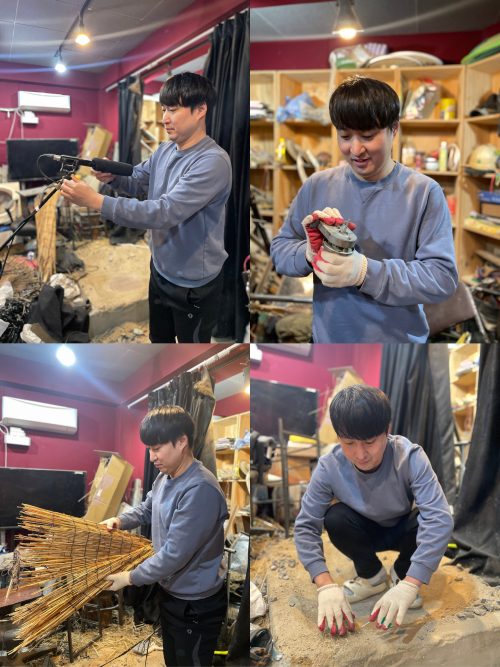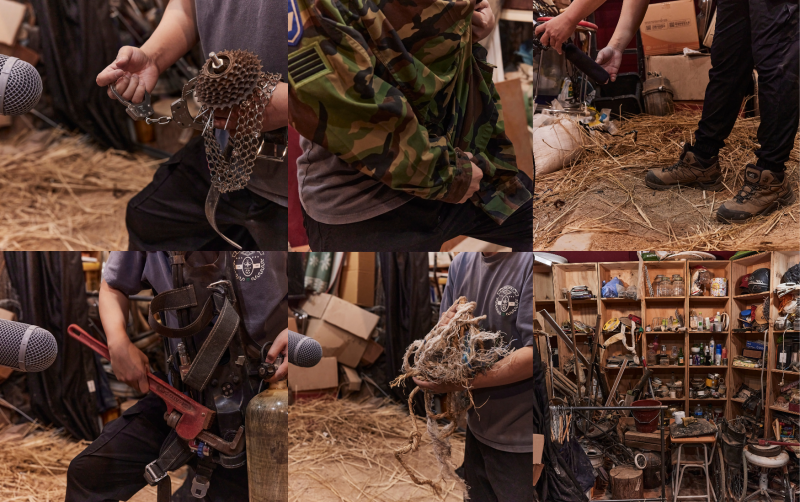- 한국어
- English
- 日本語
- 中文
- العربية
- Español
- Français
- Deutsch
- Pусский
- Tiếng Việt
- Indonesian
By Honorary Reporter Ayushi Kharayat from India
Photos = Lee Chung-gyu
What makes movies and TV shows sound so real with everyday sounds from clothes rustling and footsteps to someone biting into food? A Foley artist recreates these sounds at a studio, making sure every sound fits perfectly with what's happening on screen.
Lee Chung-gyu is one of Korea's top Foley artists. As the founder of Foleypam Studio, based in Korea, he's been creating sounds for Korean movies and TV shows for over 16 years, working on about 100 films since starting his studio in 2008.
Some of his famous works include the Oscar-winning movie "Parasite" (2019), for which he earned the prestigious Golden Reel Award of the U.S., "Snowpiercer" (2013), "Mother" (2009) and "Mickey 17" (2025). He's also created sounds for popular TV shows like "Hotel Del Luna" (2019), "Mr. Queen" (2020) and "The Silent Sea" (2021).
The following are excerpts from an email interview with Lee from Feb. 25 to March 26.

Foley artist Lee Chung-gyu works at his recording studio.
In your words, what does a Foley artist do?
Foley artists create and record everyday sounds for films and dramas using their bodies and various tools. For example, we might step on vinyl to mimic crunching leaves or shake clothes to recreate birds taking flight. What makes us unique is that we don't just create sounds, but express emotion through them. A grieving parent's footsteps or the sound of someone packing after losing their job must convey genuine feelings that match the scene.
How did you get started in this field?
I discovered this profession while in the military; I was watching a TV program about Foley artists. With my background in sound production, I was immediately fascinated by the idea of recording sounds. After returning to school, I connected with a senior in the field through my department's teaching assistant, which eventually led to my first job.
Describe your creative process and resolving problems in creating sounds.
The process begins with team meetings after we receive the edited version of a project. We plan our approach, secure equipment and sometimes scout outdoor locations. Creating the right sound often requires extensive trial and error; we might use unexpected items like an electronic notepad for phone sounds or a plastic bottle for a coffee pot. The key is achieving perfect synchronization with the visuals while making the sound feel natural and emotionally resonant.
Some of our most creative solutions have come from challenging scenes. For "Exhuma" (2024), we used sugar and salt to create the sound of eating dirt, and in "Parasite," we collected used pizza boxes from recycling bins to create authentic stacking sounds. Sometimes, we even record outdoors at dawn to capture more natural acoustics.

Lee Chung-gyu records sounds at his Foley booth, a space filled with objects and surfaces arranged to create realistic and immersive sound effects.
How has your perspective on your profession evolved?
While I knew this career would be demanding, experiencing it firsthand revealed just how physically and mentally challenging it truly is. Over time, I've learned to think more holistically about each project, focusing not just on individual sounds but how they enhance the overall storytelling.
What do you think is the future of your craft?
Despite advances in (artificial intelligence) and technology, I believe there will always be a need for the human touch in Foley work. The ability to convey genuine emotion through sound is something that requires human understanding and creativity. The job market is challenging, however, with fewer projects requiring traditional Foley work.
What advice do you have for aspiring Foley artists?
The most essential qualities are good health, stamina and physical coordination as the job involves long hours and precise movements. You also need some acting ability to mimic character emotions and actions.
Start by building a strong foundation in sound engineering through formal education and move on to apprenticeship opportunities with experienced professionals. Most importantly, develop your listening skills by actively observing and analyzing sounds in daily life; to create good sound, you first have to be good at listening.
msjeon22@korea.kr
*This article is written by a Korea.net Honorary Reporter. Our group of Honorary Reporters are from all around the world, and they share with Korea.net their love and passion for all things Korean.